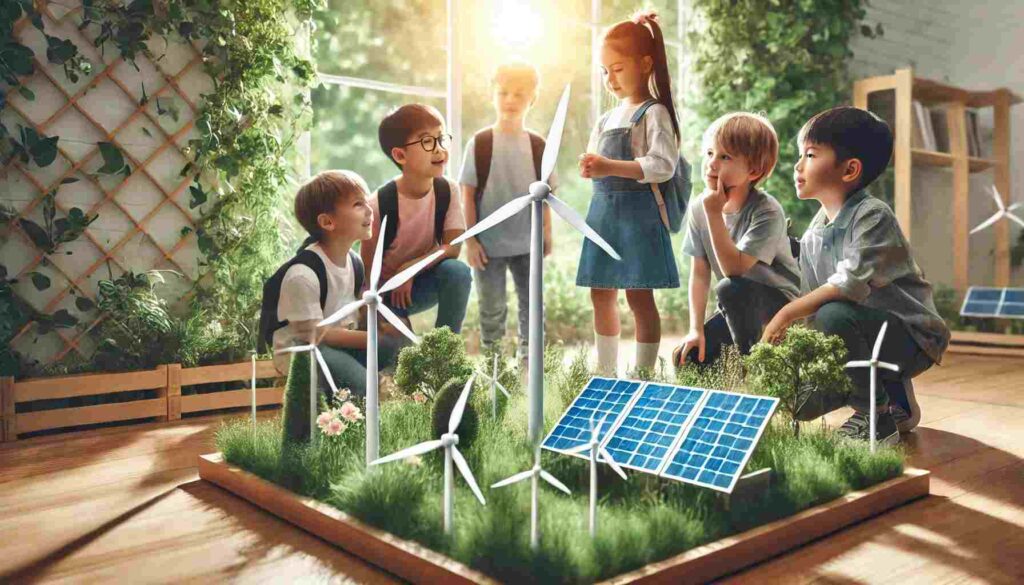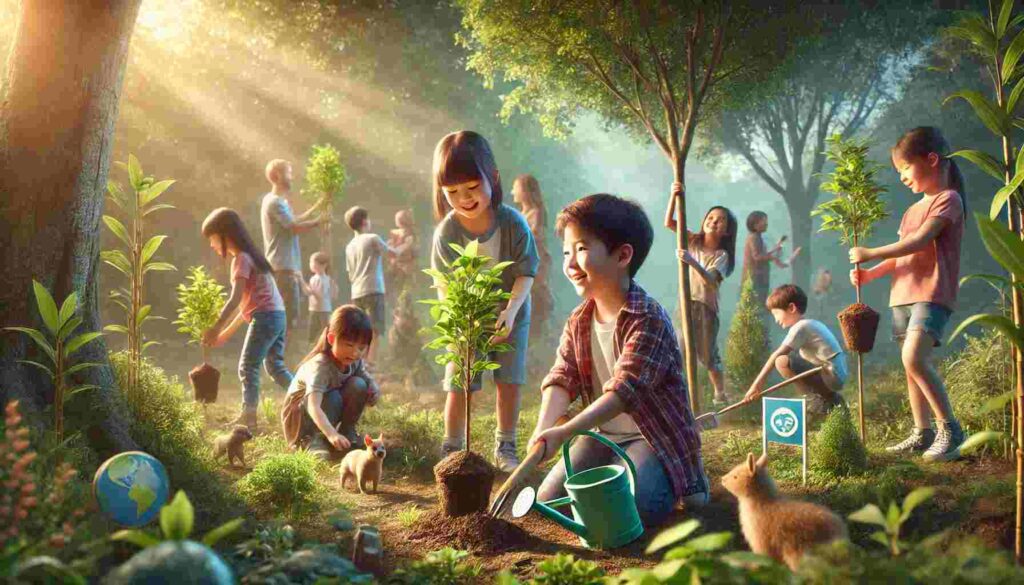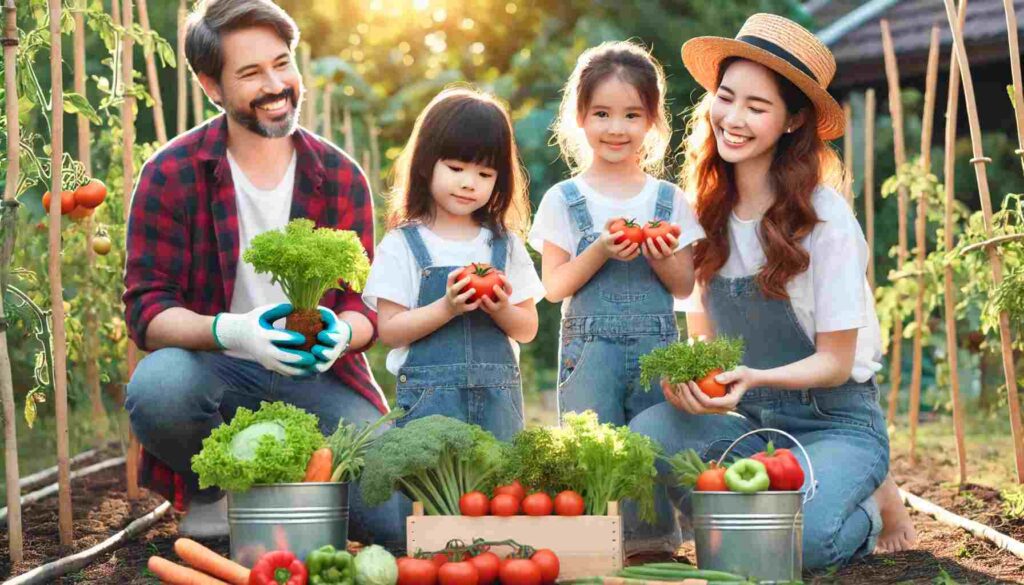In today’s world, teaching eco-awareness to children is more important than ever. With the growing environmental challenges such as climate change, pollution, and biodiversity loss, fostering a connection between kids and nature is crucial. Instilling eco-friendly habits early on will help shape future generations to be conscious of their environmental impact. This article will explore why eco-awareness is essential for kids and babies, the benefits of teaching them sustainable habits, and practical tips for parents and caregivers to encourage eco-conscious behaviors early on.
What is Eco-Awareness?
They were being eco-aware, which means bringing awareness to the environment and how the actions of human beings can affect it. Children: This is essential to build a connection with nature, teach the value of protecting the environment, and teach sustainable habits. This aims to make children and babies mindful of their choices and a better engagement relationship from that age group as they influence the planet, pushing them to make greener choices throughout their lives.
Why Start Eco-Awareness Early?
- Habit Formation
Kids are like little sponges for learning and being inspired by the rules of life from day one. The sooner they get initiated into an environment-friendly lifestyle, the better the chances of these behaviors sticking with them in the long run. They often compare it to being unable to teach a dog new tricks. Still, when you raise your child to recycle, save energy, and aggressively love the earth, that person probably grew up primed to be an environmentalist.
- Influencing Future Generations
By making environmental care a part of kids’ and babies’ lives from day one, parents and educators are shaping the future generation of eco-aware individuals. Children aware of the environment should follow this example and pass it on to their kids. This has a chain reaction effect, slowly engraining eco-conscious conduct in both families and communities.
- Building a Strong Connection with Nature
Kids who grow up in nature will likely admire and protect it. Adopting a daily walk in the fresh air and engaging with wild animals and ecosystems helps to forge strong links to surroundings. This connection is vital as it fosters care and love for our planet.
- Teaching Responsibility
An awareness of ecology also makes children feel more responsible. Learning that there is a reason behind everything they do, such as wasting water, littering, etc., can either affect the environment or not. This valuable life skill isn’t just in environmentalism.

Benefits of Eco-Awareness for Kids and Babies
- Better Physical Health
Eco-Kids also teaches eco-friendliness by spending time outside hiking, playing in parks, and gardening. These activities encourage their love for nature and decrease screen time while increasing outdoor play.
- Improved Mental Well-Being
Nature and the outdoors can improve mental health. Outdoor time is critical for kids, relieving stress, elevating mood, and inspiring creativity. Becoming eco-aware nurtures inquisitive kids and helps raise them in a positive mental state as they journey through life.
- Analytical and Problem-Solving Skills
Children who understand their environment can think critically and develop problem-solving skills. They have grown fond of looking at problems like climate change and plastic pollution differently. They try to formulate them in their locally dominant solution way, pushing them up and highlighting game-changing people.
- Social and Emotional Development
Taking care of the environment raises empathy. Educating kids on how what they do affects other people, animals, and plants also teaches them about the cycle of life. It helps them develop social and emotional intelligence, making them compassionate and empathetic.
How to Teach Eco-Awareness to Kids and Babies
- Lead by Example
Children Duplicated What They See Their Parents Do. One of the best ways to teach children about sustainability and being ‘eco-conscious’ is for a parent, caregiver, or educator to practice it themselves. Small steps such as recycling everything that can be recycled, saving water and less electricity, and using a few usable products will motivate the children to do the same.
- Read Eco-Friendly Books
Books are perfect for teaching young kids about the environment. Select Books for Kids about Recycling, Pollution, or Preserving Wildlife With Your Children. Animal and nature tales can inspire empathy and love for the environment.
- Encourage Outdoor Play
The truth is that being outdoors is one of the most beneficial methods to cultivate eco-awareness in children. Walks in the park, see different ecosystems, or just play at home. A species “is often barely taller than a small bird but can have more impact on the landscape than a large tree,” he said. “[The show] is an attempt to bring people outside and encourage them to be curious about birds, trees, insects and other natural elements.”
- Start a Garden
Gardening is a practical way for kids to connect with nature and explore sustainability concepts. By encouraging them to plant flowers, vegetables, or herbs, children learn about the life cycle of plants and how to take care of living things. It is also a great way to teach them about composting and reducing food waste.
- Teach Them About Recycling
Even small children can understand the basic idea of recycling. Establish a recycling area in your home and describe to the child how items must be separated. Turn it into a game or challenge and reward them when they recycle correctly.
- Use Eco-Friendly Toys and Products
Developing babies and young children often use various products, from diapers to toys. Use eco-friendly straws when available. This includes cloth diapers, wooden toys, and organic baby clothes. In essence, teaching kids to pick eco-friendly products when they are young forms good habits and, in time, helps them comprehend the significance of producing much less garbage.
- Celebrate Earth Day
April 22: Earth Day provides a fantastic opportunity to teach our kids about the environment. Planting trees, a park clean-up, and creating crafts with recycled materials. Sustainability can be a new family tradition that celebrates the Earth on this day every year.
- Explain Where Food Comes From
Just like everything else in the world, food is a cult crucial to educating kids. Educating them on their food and how it tastes is vital. If you can, take them to a farm or farmer’s market and explain where food comes from and why local support is essential for the environment.
Teaching Eco-Awareness to Babies
- Use Eco-Friendly Baby Products
Many products for babies are now also made to be environmentally friendly. These products make for eco-friendly baby must-haves, from organic cotton clothing to biodegradable diapers and BPA-free toys. These products mean you are brought up in a green environment from birth.
- Choose Sustainable Feeding Options
The most environmentally friendly feeding method creates no packaging, transport, or production demand. Organic, soy- and dairy-free formula choices for formula feeding. Make your baby food with organic, local ingredients as your little one moves to solid foods.
- Use Cloth Diapers
Disposable diapers are nice, but they have more impact on our landfills than you think. As you can imagine, cloth diapers are far better for the planet – and your wallet – than disposable alternatives. Yes, it is more effort; however, the environmental benefits are massive.
- Buy Second-Hand Baby Gear
Clothes, toys, and gear: As much as you hate it, your baby outgrows clothes/toys/gear at almost light speed. Rather than purchasing new, consider buying second-hand or borrowing from family and friends. It decreases the requirement for new things and provides tasty ones with its 2nd lifestyle.
- Eco-Friendly Baby Toys
Opt for toys from natural sources such as wooden or organic cotton instead of plastic. These days, many companies make eco-friendly baby toys that are safe for your little one and the planet. These toys generally last longer and are chemical-free.

The Role of Schools and Communities in Teaching Eco-Awareness
- Eco-Schools and Curriculum
The role of schools in teaching kids about the environment Some schools have even implemented eco-curricula whereby recycling, conservation, and sustainability form part of lessons. When combined with eco-friendly behaviors at the nest, these are successful programs that can make a difference in our children’s lives.
- Community Involvement
Communities can encourage eco-consciousness through local projects, such as planting events, community gardens, and recycling fundraisers. By utilizing the younger generation in these actions, they will realize that it takes a village to keep the environment safe.
- Environmental Clubs
This is why most schools and some communities have an environmental club where children can engage in environmentally friendly activities. They foster a culture of involvement in ecological concerns, often with clean-up and recycling projects or educational outreach.
Challenges in Teaching Eco-Awareness
- Overcoming Consumer Culture
One of the most significant challenges we face in teaching eco-awareness is competing against what drives modern society–consumption. This marketing and growing up in a throw-away society creates the perfect storm for children to become “professional consumers.” Parents and educators must correct these messages by highlighting the importance of sustainability and responsible consumption.
- Access to Nature
Some children, particularly those living in urban areas, need more access to natural spaces. Parents can find clever ways to connect their children with the natural environment in this scenario: urban gardens, wildlife documentaries, or visits to parks and nature sanctuaries.
- Busy Schedules
A lot of busy families will naturally struggle to find time for eco-awareness. But integrating small eco-friendly practices into the daily drill, I think reusable containers for lunches or riding bikes to school can add up quickly, with no extra time required.
Conclusion
Teaching eco-awareness to kids and babies is an investment in the future of our planet. By instilling a love and respect for the environment early on, we can raise a generation of eco-conscious individuals who are equipped to face the environmental challenges ahead. Parents, educators, and communities all have a role to play in fostering this awareness, ensuring that our children grow up with the knowledge and habits needed to protect the Earth for generations to come.



